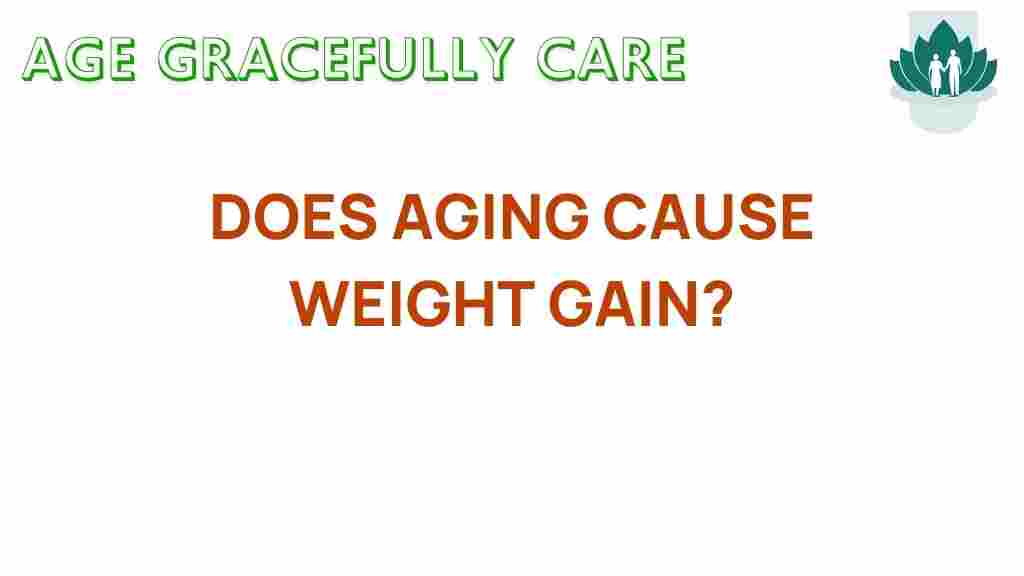Does Aging Really Lead to Weight Gain?
Aging is often associated with various changes in our bodies, one of the most talked-about being weight gain. Many people believe that as we get older, our bodies naturally gain weight due to a slower metabolism, changing hormones, and lifestyle shifts. But is this really the case? In this article, we will unravel the myths surrounding aging and weight gain, exploring the factors that influence body composition, metabolism, and health as we age.
Understanding Weight Gain and Aging
Weight gain in older adults can be influenced by numerous factors. While some may argue that aging itself leads to weight gain, it’s essential to differentiate between the effects of aging and lifestyle changes that often accompany it. Here are some key aspects to consider:
- Metabolism: As we age, our metabolism tends to slow down. This means our bodies burn calories less efficiently, which can contribute to weight gain if dietary habits remain unchanged.
- Hormones: Hormonal changes, especially during menopause for women, can lead to shifts in fat distribution and increased body fat.
- Body Composition: Aging typically results in a loss of muscle mass, known as sarcopenia, which can further decrease metabolic rate.
- Lifestyle Changes: Many people become less active as they age, leading to decreased calorie expenditure and potential weight gain.
The Role of Metabolism in Weight Management
Metabolism refers to the chemical processes that occur within the body to maintain life, including converting food into energy. As we age, our basal metabolic rate (BMR) tends to decline. This is how metabolism influences weight gain:
- Decreased Muscle Mass: Muscle burns more calories than fat. With age, muscle mass naturally decreases, leading to a lower BMR.
- Caloric Needs: Older adults often require fewer calories. If eating habits do not adjust accordingly, weight gain can occur.
Hormonal Changes and Weight Gain
Hormones play a significant role in regulating metabolism, body composition, and appetite. Changes in hormone levels during aging can lead to weight gain:
- Estrogen: In women, decreased estrogen levels during menopause can lead to increased fat storage, particularly around the abdomen.
- Testosterone: In men, lower testosterone levels can lead to a decrease in muscle mass and an increase in body fat.
- Insulin: Aging can affect insulin sensitivity, leading to greater fat storage and difficulty in losing weight.
Lifestyle Changes Affecting Weight Gain
Aging often brings about lifestyle changes that can contribute to weight gain, including:
- Decreased Physical Activity: Many adults lead more sedentary lifestyles as they age, reducing calorie expenditure.
- Dietary Changes: Older adults may change their eating habits, sometimes opting for convenience over nutrition, leading to poorer dietary choices.
- Social Influences: Changes in social dynamics, such as retirement or loss of friends, can lead to emotional eating or reduced motivation to stay active.
Nutrition: A Key Factor in Managing Weight
Proper nutrition is crucial in managing weight, especially as we age. Here are some tips to maintain a healthy diet:
- Focus on Whole Foods: Incorporate fruits, vegetables, whole grains, lean proteins, and healthy fats into your diet.
- Portion Control: Be mindful of portion sizes to avoid overeating.
- Stay Hydrated: Drinking enough water can help control hunger and improve metabolism.
- Limit Processed Foods: Reduce intake of high-sugar and high-fat processed foods that contribute to weight gain.
Exercise: The Importance of Staying Active
Regular exercise is essential for managing weight and improving health as we age. Here are some effective types of exercise to consider:
- Cardiovascular Exercise: Activities such as walking, swimming, or cycling can help burn calories and improve heart health.
- Strength Training: Lifting weights or resistance training can help build muscle mass, which boosts metabolism.
- Flexibility and Balance: Exercises like yoga and Pilates can improve flexibility and balance, reducing the risk of falls.
Troubleshooting Weight Gain: Identifying Underlying Issues
If you find yourself gaining weight despite healthy eating and regular exercise, consider the following factors:
- Medical Conditions: Conditions like hypothyroidism or polycystic ovary syndrome (PCOS) can influence weight gain.
- Medications: Certain medications, such as antidepressants or corticosteroids, can lead to weight gain as a side effect.
- Stress and Mental Health: Stress can lead to emotional eating or changes in appetite, contributing to weight gain.
If you suspect an underlying issue, consult a healthcare provider for further evaluation.
Conclusion: Aging Does Not Automatically Mean Weight Gain
While aging can lead to changes in body composition, metabolism, and hormonal levels, it does not automatically equate to weight gain. By understanding the factors involved and making conscious lifestyle choices regarding nutrition and exercise, older adults can manage their weight effectively. Aging can be a time of increased wisdom and health awareness, allowing individuals to embrace a healthier lifestyle.
To learn more about maintaining health during the aging process, check out this resource on nutrition for seniors. Remember, effective weight management is within reach at any age!
Stay active, eat well, and embrace the journey of aging with confidence!
This article is in the category Health and created by AgeGracefullyCare Team
